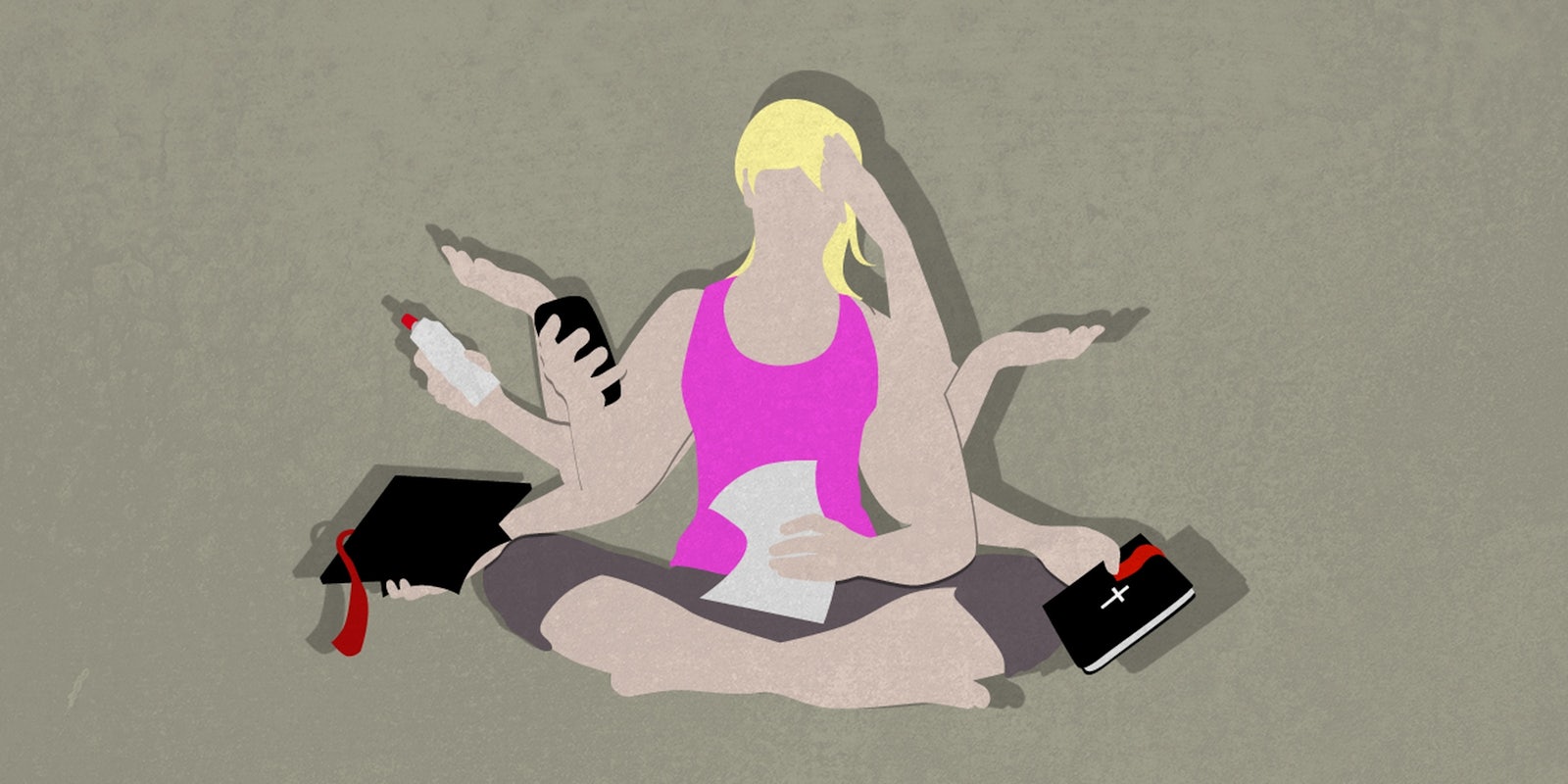Life in the internet age giving you indigestion? Try “Aunt Acid,” a monthly advice column, formerly at the Toast. The role of Aunt Acid is played by Brooklyn-based know-it-all Ester Bloom.
Dear Aunt Acid,
I’m a classic, overachieving, high-functioning depressed, anxious person. Sometimes my depression is manageable, sometimes it’s not. But I feel that I’m meeting a new low, and I’m truly at the end of my ability to think or act myself out of the state I’m in. I’m hoping you will have some advice.
Some of the issues, as I see them, are:
I’m overcommitted.
The things that need my attention include grad school, two jobs (one for money, one for passion), church stuff, a big artistic project in the works, and trying to connect with friends. Staying overcommitted makes it hard for me to do the little things that I ought to do to take care of myself—and yet I honestly can’t figure out how to cut stuff out. Everything seems essential, which might just be my ego talking, but I genuinely can’t make sense of how to do this.
I’m doing a lot of the “right” things, and I still feel like shit.
I see a therapist whom I love, and I’m on meds that I think help manage some of my symptoms. And yet.
I can’t figure out how to talk about it with the people who matter.
Many of my friends know that I work with clinical depression and anxiety, and I’ve tried to be more open to talking about it, but I sometimes can’t even get the words out without being overtaken by shame, condemnation, and feeling like a perpetual Debbie Downer. I’m disheartened because I feel like I’ve been working on this for years, and I’m still a novice. And it’s making me feel crazier and sadder than I’ve maybe ever felt.
I know what I’m supposed to say and do, and none of it seems to make my heart feel better.
I’m a religious person; I pray and I worship, and I don’t feel like God responds. I do my artistic work, and everything falls short of giving me a sense of passion. I know that I shouldn’t equate what I do with what I’m worth, but I’m always longing for something that I can’t seem to get.
Does this make any sense? Part of me is not even sure what I’m asking you—maybe just for some words that are different than all the words that are perpetually running through my head.
Thank you,
Hurting, Confused, and Uncertain
Dear Hurting,
You know what you have to do: Pare down. Now you need the courage and the incentive to do it.
Overcommitment is one of the biggest problems we all face in the age of the internet and social media. Too many of us have the sense that we must be in a constant state of building-going-creating that leads to a climate in which we’re always doing and yet never satisfied with what we’ve done. We achieve, we accomplish, we earn, we record, so that we can have a “brand” that is synonymous with success. If we’re not content, though—if we don’t feel at least low-key lucky in our lives—none of it means a damn thing.
Forget about your “I don’t know how she does it!” type-A brand. You’re in pain. You need to go into triage mode. Your mind has been trying to get your attention for a while now; if you don’t address the problems, it will be your body’s turn to fall apart next. When bodies demand our attention, whether in the form of ulcers or IBS, hemorrhoids or heart attacks, the results are often messy, difficult, and expensive. You don’t want to get to that point.
Your actual health is at stake. If you think I’m being over-dramatic, re-read your letter. It is a cry for help.
And that’s great, really. Asking for help is an important skill, one that many overcommitted overachievers lack. You are recognizing that, however amazing and impressive you want to (and probably do) appear to others, you can’t dig your own way out of this hole.
So what can you do? Generate data.
Start tracking your commitments.
For a few days (or a week, if you can swing it), try to keep records of how you spend each hour. Create a letter or a color code for your major categories: school, God, chores, art, job #1, job #2 (!), free time (lol), sleep (double lol), etc. I imagine you’re an Excel aficionado, so if you want to spreadsheet this, go to town.
After you’ve documented each hour and coded it, add one more bit of information: a rating of how much you enjoyed that hour on a scale of 1–10.
The reason this helps is that our memories are notoriously faulty. In this op-ed from the Times, a working mother of four realized, by doing something similar, “that the stories I told myself about where my time went weren’t always true. The hour-by-hour rhythm of my life was not quite as hectic as I’d thought.” (In related reading, I also recommend Tim Kreider’s essay “The Busy Trap,” in which he points out that most people, in his experience, are “busy because of their own ambition or drive or anxiety, because they’re addicted to busyness and dread what they might have to face in its absence.” To a large degree, he blames peer pressure, which as we all know by now is amplified 1,000 times by social media.)
Once you do this tracking, you’ll have real data on how you spend your time—and whether, in the moment, you actually enjoy the things you think you enjoy, or detest what you think you detest. You can use the data to make your perceptions more accurate and your life better.
Analyze.
Go through the data and look for patterns. On average, how much do you enjoy the time you spend on your art? On school? At your jobs? Try to be unbiased and open to the unexpected. Some of what you’ll find will seem obvious—hey, you enjoy art more than chores!—but if you’re honest, some of what you’ll find will surprise you.
Apply what you’ve found and create priorities.
Rank your results. Which activities get, on average, an 8–10? Which get at least, on average, a 5–7? And which fall below a 5?
Cut, ruthlessly.
There are things all of us have to do that we don’t enjoy. No one has a life made up entirely of 7s-10s. But if your spreadsheet is a mess of 3s and 4s, it’s time to fundamentally restructure your life. What are the 3s and 4s, and how can you make them optional and/or reduce your exposure to them? If they’re chores, for example, try outsourcing laundry or meal-prep. Based on your letter, though, the problem seems to be not merely that you’re doing too much, but also that so many of the activities that should be filling you up are actually sucking you dry.
Maybe you always assumed you had to go to grad school. Maybe you thought that your life wouldn’t have meaning without your artistic or spiritual endeavors. But if those time-consuming activities aren’t bringing you joy, well, they might need to be KonMari’ed like a pair of discolored, thinned-out socks.
Not possible? Anything’s possible. Have you been watching the Olympics? If human beings can defy the laws of physics the way gymnasts and high jumpers can, you can declutter your life, even of the things that feel “essential.” It just means you may need to make sacrifices.
People who are dissatisfied quit grad school mid-way through. (See: ABD support groups.) People take breaks, sometimes for years at a stretch, from what had been their creative outlets, and return, later, refreshed. People change churches, or denominations, or religions. (See: the Toast’s conversion series.) People even give notice at their jobs and take on debt, or borrow money from family, to get by. In case of emergency, break glass, right? This is the time to break whatever glass seems to be in front of you, keeping you from what you need.
There is no option so outlandish that it can’t work for you. The only truly unsustainable option, in your case, is the status quo.
You can do this. You have a clear head and a good heart, the will to change, and the motivation of knowing that your suffering will continue until you do. You’ve asked me for help; now ask for help from the other people around you, people who love you and who want you to thrive. Take a deep breath. Break the glass.
Good luck,
Aunt Acid
Have a question for Aunt Acid? Email her at ourauntacid@gmail.com.




